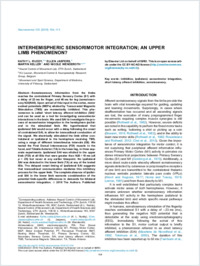Interhemispheric sensorimotor integration; an upper limb phenomenon?
- Ruddy, Kathy L. Neural Control of Movement Lab, ETH Zurich, Switzerland
- Jaspers, Ellen Neural Control of Movement Lab, ETH Zurich, Switzerland
- Keller, Martin Movement and Sport Science, Department of Medicine, University of Fribourg, Switzerland
- Wenderoth, Nicole Neural Control of Movement Lab, ETH Zurich, Switzerland - KU Leuven, Movement Control & Neuroplasticity Research Group, Belgium
-
01.10.2016
Published in:
- Neuroscience. - 2016, vol. 333, p. 104–113
English
Somatosensory information from the limbs reaches the contralateral Primary Sensory Cortex (S1) with a delay of 23 ms for finger, and 40 ms for leg (somatosensory N20/N40). Upon arrival of this input in the cortex, motor evoked potentials (MEPs) elicited by Transcranial Magnetic Stimulation (TMS) are momentarily inhibited. This phenomenon is called ‘short latency afferent inhibition (SAI)’ and can be used as a tool for investigating sensorimotor interactions in the brain. We used SAI to investigate the process of sensorimotor integration in the hemisphere ipsilateral to the stimulated limb. We hypothesized that ipsilateral SAI would occur with a delay following the onset of contralateral SAI, to allow for transcallosal conduction of the signal. We electrically stimulated the limb either contralateral or ipsilateral to the hemisphere receiving TMS, using a range of different interstimulus intervals (ISI). We tested the First Dorsal Interosseous (FDI) muscle in the hand, and Tibialis Anterior (TA) in the lower leg, in three separate experiments. Ipsilateral SAI was elicited in the upper limb (FDI) at all ISIs that were greater than N20+18 ms (all p < .05) but never at any earlier timepoint. No ipsilateral SAI was detected in the lower limb (TA) at any of the tested ISIs. The delayed onset timing of ipsilateral SAI suggests that transcallosal communication mediates this inhibitory process for the upper limb. The complete absence of ipsilateral SAI in the lower limb warrants consideration of the potential limb-specific differences in demands for bilateral sensorimotor integration.
- Faculty
- Faculté des sciences et de médecine
- Department
- Département de Médecine
- Language
-
- English
- Classification
- Biological sciences
- License
- License undefined
- Identifiers
-
- RERO DOC 277699
- DOI 10.1016/j.neuroscience.2016.07.014
- Persistent URL
- https://folia.unifr.ch/unifr/documents/305146
Statistics
Document views: 58
File downloads:
- kel_isi.pdf: 122
